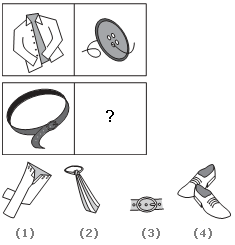Discussion
Home ‣ Logical Reasoning ‣ Logical Deduction See What Others Are Saying!
- Question
Statements: Some boxes are hammers. Some hammers are beads. All beads are rings.
Conclusions:
- Some rings are hammers.
- Some hammers are boxes.
- Some rings are boxes.
Options- A. None follows
- B. Only I follows
- C. Only I and II follow
- D. Only II and III follow
- E. All follow
- Correct Answer
- Only I and II follow
ExplanationII is the converse of first premise and so it holds.Some boxes are hammers. Some hammers are beads.
Since both the premises are particular, no definite conclusion can be drawn.
Some hammers are beads. All beads are rings.
Since one premise is particular, the conclusion must be particular and should not contain the middle term. So, it follows that 'Some hammers are rings'. I is the converse of this conclusion and so it holds.
Some boxes are hammers. Some hammers are rings.
Since both the premises are particular, no definite conclusion can be drawn.
More questions
- 1. Choose the picture that would go in the empty box so that the two bottom pictures are related in the same way as the top two:

Options- A. 1
- B. 2
- C. 3
- D. 4 Discuss
Correct Answer: 3
Explanation:
A shirt is to a button as a belt is to a belt buckle. A button is used to close a shirt; a belt buckle is used to close a belt.- 2. Which word does NOT belong with the others?
Options- A. couch
- B. rug
- C. table
- D. chair Discuss
Correct Answer: rug
Explanation:
The couch, table, and chair are pieces of furniture; the rug is not.- 3. Which word does NOT belong with the others?
Options- A. eel
- B. lobster
- C. crab
- D. shrimp Discuss
Correct Answer: eel
Explanation:
The lobster, crab, and shrimp are all types of crustaceans; an eel is a fish.- 4. 14 14 26 26 38 38 50
Options- A. 60 72
- B. 50 62
- C. 50 72
- D. 62 62
- E. 62 80 Discuss
Correct Answer: 50 62
Explanation:
In this simple addition with repetition series, each number in the series repeats itself, and then increases by 12 to arrive at the next number.- 5. All guilty politicians were arrested. Kishan and Chander were among those arrested.
Options- A. All politicians are guilty.
- B. All arrested people are politicians.
- C. Kishan and Chander were not politicians.
- D. Kishan and Chander were guilty. Discuss
Correct Answer: Kishan and Chander were guilty.
- 6. Statement: Is caste-based reservation policy in professional colleges justified?
Arguments:
- Yes. The step is a must to bring the underprivileged at par with the privileged ones.
- No. It obstructs the establishment of a classless society.
- Yes. This will help the backward castes and classes of people to come out of the oppression of upper caste people.
Options- A. Only I and II are strong
- B. Only II is strong
- C. Only II and III are strong
- D. Only I and III are strong
- E. All are strong Discuss
Correct Answer: Only II is strong
Explanation:
Clearly, capability is an essential criteria for a profession and reservation cannot ensure capable workers. So, neither I nor III holds strong. However, making one caste more privileged than the other through reservations would hinder the objectives of a classless society. So, argument II holds strong.- 7. Statement: 'Guests should be provided lunch.' - A tells B.
Assumptions:
- Unless told, lunch may not be provided.
- Guests will stay during lunch time.
Options- A. Only assumption I is implicit
- B. Only assumption II is implicit
- C. Either I or II is implicit
- D. Neither I nor II is implicit
- E. Both I and II are implicit Discuss
Correct Answer: Both I and II are implicit
Explanation:
Since both I and II follow from the statement, so both are implicit.- 8. Which word does NOT belong with the others?
Options- A. dodge
- B. flee
- C. duck
- D. avoid Discuss
Correct Answer: flee
Explanation:
Dodge, duck, and avoid are all synonyms meaning evade. Flee means to run away from.- 9. Statement: Should agriculture in rural India be mechanized?
Arguments:
- Yes. It would lead to higher production.
- No. Many villagers would be left unemployed.
Options- A. Only argument I is strong
- B. Only argument II is strong
- C. Either I or II is strong
- D. Neither I nor II is strong
- E. Both I and II are strong Discuss
Correct Answer: Only argument I is strong
Explanation:
Clearly, mechanization would speed up the work and increase the production. So, argument I is strong enough. Argument II is vague because mechanization will only eliminate wasteful employment, not create unemployment.- 10. 28 25 5 21 18 5 14
Options- A. 11 5
- B. 10 7
- C. 11 8
- D. 5 10
- E. 10 5 Discuss
Correct Answer: 11 5
Explanation:
This is an alternating subtraction series with the interpolation of a random number, 5, as every third number. In the subtraction series, 3 is subtracted, then 4, then 3, and so on.
Comments
There are no comments.
- 1. Choose the picture that would go in the empty box so that the two bottom pictures are related in the same way as the top two:
More in Logical Reasoning:
Programming
Copyright ©CuriousTab. All rights reserved.
